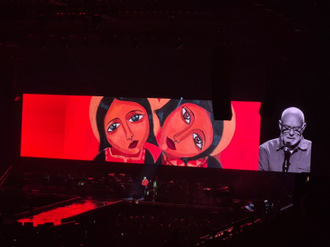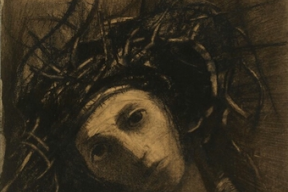Review: 'Together For Palestine' Concert

I cannot recall an evening of such powerful and conflicting emotions as those communicated at the profoundly moving 'Together for Palestine' Concert at Wembley Arena on Thursday.
The musician Brian Eno was the prime mover of the urgent fundraiser which raised £1.5 million on a night when Palestinian performers excelled, supported by a range of British and international colleagues and activists. Over 70 artists raised funds for the Palestinian Children's Relief Fund, Palestinian Medical Relief Society, and the NGO development charity Taawon. Special guests who provided testimony of their work on the ground were met with huge warmth even while their words provoked immense sorrow and anger.
The acclaimed plastic surgeons, Dr Ghassan Abu Sitta, Rector of Glasgow University, and Dr Victoria Rose, paid tribute to all their colleagues in Gaza. Dr Sitta said: "Beyond the elimination of the Palestinian people, what this televised genocide aims to do is to normalise a level of brutality that is unprecedented, to normalise the slaughter of over 20,000 children, to normalise the intentional destruction of a health system and the targeted killing of a whole generation of doctors and nurses as a way of turbo-charging its genocidal killing machine by denying the wounded any medical treatment. … Israel is now drunk on Western impunity …, funded and aided by its Western allies. … Only sanctions can stop the genocide."
He continued: "And now, let us bow our heads, and honour the thousands of health workers in Gaza that are being murdered while treating the wounded, that are being starved while trying to nourish others, the real heroes that are saving lives while sacrificing their own."
Behind the two doctors, a host of ghostly white coats were raised aloft by fellow health-workers. A huge over-head screen displayed the names and images of medics who had been killed.
Francesca Albanese, the UN's special rapporteur for the occupied territories, said: "Our governments turn a blind eye; or worse, they are complicit. They trade weapons. They host Israeli officials. They silence dissent by labelling it anti-semitism and they criminalise as terrorists those who stand against genocide."
The journalist Mehdi Hasan denounced the Western media: "It infuriates me when they [Western journalists] say Israel needs to allow journalists into Gaza. Yes, Israel does - but Western media must stop acting as if there aren't any journalists in Gaza." He cited an obscene statistic: more journalists have been killed in Gaza since 7th October than the number of journalists killed during the Korean war, the Vietnam war, the Iraq war and both World Wars combined. "They were killed as part of Israel's deliberate campaign to blind the world, to erase all evidence of their crimes," Hasan said. "To the genociders, there is nothing more dangerous than a camera lens or a microphone."
"The Palestinian journalists, they are the best of us," he added. "They have shown the world you can't bomb the truth away." (Everyone chanted this alongside him.) "You will not silence Gaza."
He then introduced the Gazan journalist Yara Eid who recounted the killings of so many of her own family members and her beloved "soulmate" Ibrahim. She paid passionate homage to all her slaughtered colleagues and proclaimed: "Israel will never silence me… even if they kill me," to huge cheers. She then introduced a video montage paying tribute to all the Palestinian journalists killed by Israeli forces in Palestine which became a nightmarish blur of fast-vanishing images.
Other powerful interventions remembered all the Palestinians illegally incarcerated in Israel, urging solidarity and concerted action. The celebrated French footballer Eric Cantona urged a sporting boycott of Israel and slammed the European and World football bodies UEFA and FIFA for failing to do so.
A moving tribute was also paid to the 'Palestinian Pele', Suleiman al-Obeid, gunned down when seeking food for his family. The Holocaust survivor Stephen Kapos drew a huge cheer for his indefatigable campaigning inspired by his own lived experience of a previous genocide. In a surprise appearance, the actor Richard Gere said: "Netanyahu has to go, and all the enablers have to go also…. In one day, President Trump could stop all this craziness."
A feast of varied and sensitively selected music topped and tailed the spoken word. Eno's own all-star performance with Paul Weller, Nadine Shah and friends culminated in a moving reading of Palestinian poet Khaled Juma's poem 'Oh Rascal Children of Gaza' with oud player Adnan Joubran's melodious lament transcending an intense guitar-wall of sound. Dressed in a keffiyeh-inspired dress, Paloma Faith sang of 'a dangerous world', James Blake sang 'Godspeed' and the Nigerian Obongjayar 'God's Own Children'.
But among the many superb acts, the rich variety of Palestinian artistry struck most deeply. The concert's Art Director Malak Matar said the art performed and displayed signified "perseverance and hope", adding it was, "the people of Gaza's unbreakable will to live and to create."
Working alongside the renowned stage designer Es Devlin, Matar had curated a selection of Palestinian artworks for the show, some by artists who had died during the conflict. Images such as doves, birds, wide-eyed children tenderly embracing and Guernica-like carnage provided stunning backdrops to the performances.
A prayer of absolute faith in God was chanted.
Elyanna sang her mother's composition 'Olive Branch' to an amphitheatre of mobile phone torchlight, while everyone present danced to the London Arab Orchestra's joyful medley, featuring a stirring 'Dammi Falastini'.
Faraj Suleiman's jazz piano was virtuosic and thrilling while rapper El Far3i's acoustic guitar and rhythmic vocal performance alongside actor Guy Pearce and poet and playwright Inua Ellams produced a poignant tribute to the dead Palestinian men often unaccounted for in official figures. Particularly moving was the recollection of a mother's blessed bread and the climactic: 'Forget us but save them [the women and children]!'
The superbly talented Nai Barghouti from the West Bank brought the house down with her stunning vocal range and plangent phrases on the ney flute. Performing her own composition, 'If I Must Die' - written to the poem of the same name by the late Palestinian doctor Refaat Alareer - she dedicated her performance to the memory of the five-year-old Palestinian girl Hind Rajab.
Almost two years on from the start of the genocide, Derry Girls actress Nicola Coughlan urged action and her colleague Florence Pugh declared: "Silence in the face of such suffering is not neutrality, it is complicity. Empathy should not be this hard - and it should never have been this hard."
Earlier on, the Gazan journalist Yara Eid had said: "Start a new chapter of becoming an advocate," while Francesca Albanese had advised: "History shows us that human rights are never simply granted. Justice is won through the sweat and the courage of ordinary people: people like the Palestinians, people like the Israelis who resist from within their convulsed society, people like you. History teaches us this. So, we must own this responsibility. And if you enjoy human rights, don't dismiss them as just symbolic. … The law is not what is failing us. It is our governments' refusal to implement it. … We need to imagine a new multilateralism which is for the many not for the few."


















